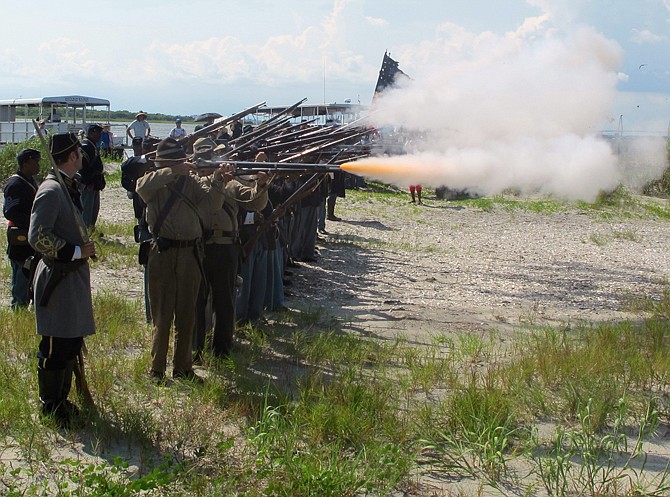SULLIVAN'S ISLAND, S.C. (AP) - Civil War re-enactors gathered on a wind-swept beach and marked the 150th anniversary Thursday of the famed attack by the black 54th Massachusetts Volunteer Infantry - a battle that showed the world black soldiers could fight and later was chronicled in the movie "Glory."
More than 50 re-enactors, including a handful in Confederate butternut uniforms, left wreaths on South Carolina's Morris Island honoring those who died there in the 1863 Union attack on Confederate Battery Wagner. The island bordering Charleston Harbor is uninhabited and the battery itself has washed away since the Civil War.
Those observing the anniversary prayed and sang "The Battle Hymn of the Republic." As part of the commemoration, they also fired a three-gun rifle volley to salute the dead.
The 54th was raised in Boston and of the 600 black Union troops who bravely charged Confederate defenses at Battery Wagner, 218 were killed, wounded or captured in fierce fighting. The 54th later served in South Carolina, Georgia and Florida before returning to Massachusetts at war's end.
Re-enactor Mel Reid told a gathering of about 50 people gathered on the beach that many members of the 54th never made it back home and those who did were not cheered when they came home.
"So here we are 150 years later saying "thank you,"' he said. "Keep in mind, these were free black men" who risked being enslaved if captured, he told the gathering.
Thursday evening there was period music, speeches, and rifle and cannon firing at Fort Moultrie on nearby Sullivan's Island. The event corresponded with the time of the evening attack 150 years ago.
Following the program, the audience of about 200 put battery-powered candles in luminaries on a field beside the fort. There were 294 in all - one for each fallen soldier both North and South.
"The story of both the Confederates and the federals who fought that day is the story of the American people in their travel through time," said South Carolina Lt. Governor Glenn McConnell, himself a Civil War re-enactor, in his keynote address. "Our march through history ... is the story of a people who, in the pursuit or defense of freedom, as they perceived or understood it, were always willing to put aside the element of fear and answer the call of duty."
"This is probably the most significant anniversary of the 150th anniversaries of the Civil War," Walter Sanderson, a re-enactor from Upper Marlboro, Md., said earlier. "It was a primary test for African-American troops in a very difficult assault. They proved themselves to be a quality regiment under the most severe duress."
Usually, there are about a dozen black re-enactors who make the trip to Morris Island each year. The black re-enactors gathered Thursday came from as far away as California.
"Going out on that island has special meaning today," said Joe McGill, a black Charleston re-enactor who makes the journey every July 18.
The attack was part of an unsuccessful campaign by federal forces to capture Charleston, the city where the Civil War began in 1861 with the Confederate bombardment of Fort Sumter in the harbor. The Confederates would hold Charleston until late in the war, when they abandoned it as Union troops moved across South Carolina further to the west.
While the Battery Wagner attack was unsuccessful, the valor of the black troops dispelled the thought - common in both the North and the South early in the war - that blacks could not fight. It also encouraged the enlistment of another 200,000 black troops in the Union army.
"It's just an honor to be here. The 54th proved that black troops could fight in a battle," said Louis Carter of Richmond, Va. He said Battery Wagner and several earlier smaller fights involving black troops "disproved that stereotype that we would run."
"Glory" will be shown Friday on an outdoor screen in Marion Square in Charleston. The 1989 film starring Matthew Broderick, Denzel Washington and Morgan Freeman helped bring the story of the 54th Massachusetts to a wider audience.
Scholars and authors gather at the historic Dock Street Theatre on Saturday to discuss the 1863 Charleston campaign. On Sunday, Charleston officials plan to unveil a rendering of a planned monument to the 54th Massachusetts to be erected on Charleston's Battery.

